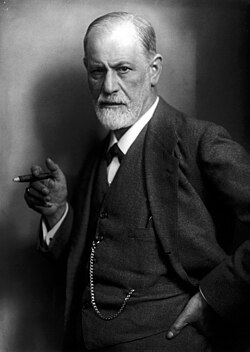Portal:Psychiatry/Selected article/11

Portal:Psychiatry/Selected article/11

Psychoanalysis is a set of psychological and psychotherapeutic theories and associated techniques, created by Austrian neurologist Sigmund Freud and stemming partly from the clinical work of Josef Breuer and others. Since then, psychoanalysis has expanded and been revised, reformed, and developed in different directions.
History[edit]
Psychoanalysis began with the work of Sigmund Freud in the late 19th century. Freud's theories on the unconscious mind, the Oedipus complex, and the mechanisms of repression were groundbreaking. He developed therapeutic techniques such as the use of free association, transference, and dream interpretation.
Key Concepts[edit]
- Unconscious mind: A reservoir of feelings, thoughts, urges, and memories that are outside of conscious awareness.
- Id, ego, and super-ego: Three parts of the psyche; the id is the set of uncoordinated instinctual desires, the super-ego plays the critical and moralizing role, and the ego is the organized, realistic part that mediates between the desires of the id and the super-ego.
- Defense mechanisms: Psychological strategies brought into play by various entities to cope with reality and to maintain self-image.
- Transference: The redirection of feelings and desires and especially of those unconsciously retained from childhood toward a new object.
- Free association: A practice in psychoanalytic therapy in which a patient talks of whatever comes into their mind.
Techniques[edit]
Psychoanalytic therapy involves a range of techniques aimed at exploring the unconscious mind. These include:
- Free association: Encouraging patients to verbalize thoughts as they occur without censorship.
- Dream analysis: Interpreting the content of dreams to uncover the unconscious desires and thoughts.
- Transference: Analyzing the transfer of feelings from the patient to the therapist.
Influence and Criticism[edit]
Psychoanalysis has had a profound impact on psychology, psychiatry, literature, and art. However, it has also faced significant criticism for its lack of empirical evidence and scientific rigor. Critics argue that many of Freud's theories are untestable and that psychoanalysis is more of a pseudoscience than a legitimate scientific discipline.
Modern Developments[edit]
While traditional psychoanalysis is less common today, its concepts have influenced many modern psychotherapeutic approaches, including psychodynamic therapy, cognitive-behavioral therapy, and humanistic therapy.
See also[edit]
- Sigmund Freud
- Carl Jung
- Alfred Adler
- Psychodynamic therapy
- Cognitive-behavioral therapy
- Humanistic therapy
References[edit]
<references group="" responsive="1"></references>
External links[edit]
Lua error: bad argument #2 to 'title.new' (unrecognized namespace name 'Portal').
Ad. Transform your life with W8MD's Budget GLP-1 injections from $75


W8MD offers a medical weight loss program to lose weight in Philadelphia. Our physician-supervised medical weight loss provides:
- Weight loss injections in NYC (generic and brand names):
- Zepbound / Mounjaro, Wegovy / Ozempic, Saxenda
- Most insurances accepted or discounted self-pay rates. We will obtain insurance prior authorizations if needed.
- Generic GLP1 weight loss injections from $75 for the starting dose.
- Also offer prescription weight loss medications including Phentermine, Qsymia, Diethylpropion, Contrave etc.
NYC weight loss doctor appointmentsNYC weight loss doctor appointments
Start your NYC weight loss journey today at our NYC medical weight loss and Philadelphia medical weight loss clinics.
- Call 718-946-5500 to lose weight in NYC or for medical weight loss in Philadelphia 215-676-2334.
- Tags:NYC medical weight loss, Philadelphia lose weight Zepbound NYC, Budget GLP1 weight loss injections, Wegovy Philadelphia, Wegovy NYC, Philadelphia medical weight loss, Brookly weight loss and Wegovy NYC
|
WikiMD's Wellness Encyclopedia |
| Let Food Be Thy Medicine Medicine Thy Food - Hippocrates |
Medical Disclaimer: WikiMD is not a substitute for professional medical advice. The information on WikiMD is provided as an information resource only, may be incorrect, outdated or misleading, and is not to be used or relied on for any diagnostic or treatment purposes. Please consult your health care provider before making any healthcare decisions or for guidance about a specific medical condition. WikiMD expressly disclaims responsibility, and shall have no liability, for any damages, loss, injury, or liability whatsoever suffered as a result of your reliance on the information contained in this site. By visiting this site you agree to the foregoing terms and conditions, which may from time to time be changed or supplemented by WikiMD. If you do not agree to the foregoing terms and conditions, you should not enter or use this site. See full disclaimer.
Credits:Most images are courtesy of Wikimedia commons, and templates, categories Wikipedia, licensed under CC BY SA or similar.
Translate this page: - East Asian
中文,
日本,
한국어,
South Asian
हिन्दी,
தமிழ்,
తెలుగు,
Urdu,
ಕನ್ನಡ,
Southeast Asian
Indonesian,
Vietnamese,
Thai,
မြန်မာဘာသာ,
বাংলা
European
español,
Deutsch,
français,
Greek,
português do Brasil,
polski,
română,
русский,
Nederlands,
norsk,
svenska,
suomi,
Italian
Middle Eastern & African
عربى,
Turkish,
Persian,
Hebrew,
Afrikaans,
isiZulu,
Kiswahili,
Other
Bulgarian,
Hungarian,
Czech,
Swedish,
മലയാളം,
मराठी,
ਪੰਜਾਬੀ,
ગુજરાતી,
Portuguese,
Ukrainian
